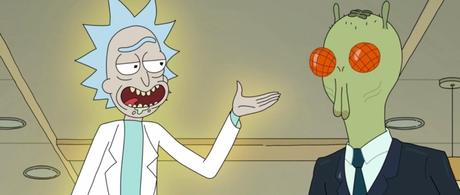
Every time I watch Rick and Morty I alternate between belly laughs (great jokes) and slight smirks (clever sci-fi and fantasy parodies) followed by a deeply depressing thought: these guys are probably going to be dead soon.
The "guys" to whom I am referring are show co-creators Dan Harmon and Justin Roiland, the former the tortured, combative, wildly self-destructive genius behind Community and the latter a multi-hyphenate talent (writer, voice actor, stand-up comedian, director, video game developer) responsible for the voices of both Rick and Morty, including the former's increasingly prolonged beer burps. It's an indelicate, overly harsh thought to have on my part, and I in no way wish the worst possible outcome for either of them as they both possess insanely creative minds (and, you know, probably have loved ones who'd love to see them stick around for decades to come). However, with each increasingly inebriated podcast appearance I hear them on, and with each new purposefully morose detour their show takes I get the impression of watching a long, dark night of the soul which is simply growing longer and darker.
I come to this thought with Harmon after the steady churn of BTS horror stories from his Community days as well as his deeply illuminating documentary Harmontown. With Roiland, I hear him talk about getting drunk to record his dialogue, and alternate between viewing these partners in crime as the punk rockers of adult animation or simply high-functioning addicts (or both).
However, such concerns are way beyond the bounds of what I should be doing, which is reviewing the Rick and Morty season 3 premiere that AdultSwim surprisingly, but only temporarily streamed on a loop on its website last night. It's the first new proper episode of the show in 18 months (Harmon has repeatedly taken the blame for the delay), and the rest of the season still has no set start date, although we at least know it will be some time this summer.
When last we left the gang, Rick had voluntarily given himself up to be imprisoned by the intergalactic agency known as The Federation. He did it to free his family from a life on the run but neglected to tell them as much, thus leaving them to feel abandoned. It was but the latest come to Jesus moment where the show saw fit to acknowledge Rick's softer side, that he does have a heart and is not simply the hedonistic, abusive, uncaring, selfish cartoon embodiment of his co-creators' ID he normally seems to be.
From the get-go, Rick and Morty has pitched itself as a version of Back to the Future or Doctor Who where the central crazy scientist is kind of a monster of a human being, constantly belittling his own Marty McFly/companion (in this case, his grandson Morty) and showing little regard for anyone's personal safety, especially when you can always just grab another Morty from an alternate universe. Whenever Harmon and Roiland relent and pull their "Rick's small heart grew three sizes that day" trick they then go out of their way to not only undercut that emotional growth but also openly mock the notion of paint-by-TV-numbers character development, much as Harmon did time after time with Jeff on Community.
Thus it is that the season 3 premiere, "The Rickshank Rickdemption," ends [spoiler alert] with Rick disturbingly turning into a mad supervillain towering over an increasingly terrified Morty. The majority of the episode is standard grade Rick and Morty craziness. Rick engineers a prison escape (easily outsmarting an alien captor voiced by Nathan Fillion) and then aims to take down the entire Federation as well as the army of alt-dimension Ricks who view him as the greatest threat to reality. Meanwhile, Summer and Morty go in search of Rick, the latter trying to convince the former that Grandpa Rick doesn't care about them.
And for all of "Rickshank Rickdemptions" inventive sci-fi shenanigans the emotional core of the episode rested in the question of whether or not Rick actually cares about his family. The general trajectory was he does, he doesn't, he does, he really, really doesn't, ending with the aforementioned sequence where a power-mad Rick boasted to Morty about how he killed off his rivals, caused Jerry's sudden exit from the family (he forced Beth to choose, and she chose her dad) and didn't actually give a fuck about them. All he truly cares about is the special Mulan Szechuan sauce McDonald's once ran as a promotion, and now that he has absolute power he will track that damn sauce down. To be fair, I remember that sauce, and it was amazing. But, still...
Look. I dig Rick and Morty. The show makes me laugh, and the various send-ups of genre staples and standard sitcom storytelling are classic Harmon. But when I watch the central character stand over his grandson in a threatening fashion while yelling "we're going dark this season" I circle back to wondering what it is about the two geniuses behind this show which drives them to such not just dark places but self-aware, boastfully dark places.
Do you dig Rick and Morty' s darker side? Is it a little too much for you? Am I a little too much for you, reading way too much into the motivations behind a silly cartoon? Let me know in the comments.

